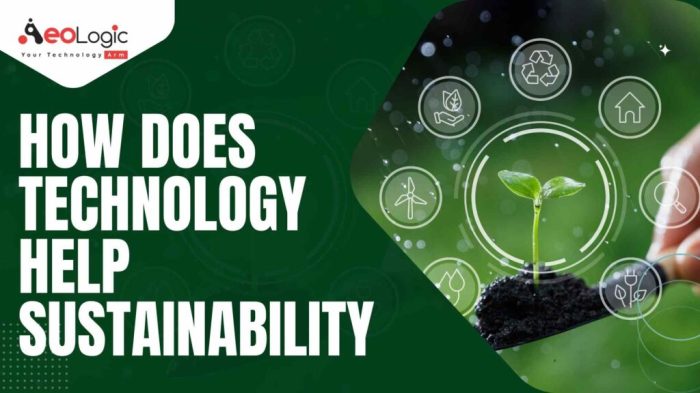Tech companies fast track sustainability goals – Tech companies are increasingly recognizing the urgency of sustainability, driven by rising consumer demand, environmental concerns, and the growing impact of climate change. This shift towards sustainable practices is not just about doing good; it’s about ensuring the long-term viability of the tech industry itself.
From reducing their carbon footprint to adopting circular economy models, tech companies are exploring innovative solutions to minimize their environmental impact. This journey involves a deep dive into resource optimization, renewable energy adoption, and even the application of emerging technologies like AI and blockchain to drive sustainable practices.
The Growing Importance of Sustainability in Tech
The tech industry, once seen as a driver of innovation and progress, is increasingly facing scrutiny for its environmental impact. As the industry continues to grow, so too does its consumption of resources and its contribution to climate change.
You also will receive the benefits of visiting 5 tips to get the most out of your workation today.
This has led to a growing demand for tech companies to adopt sustainable practices and reduce their environmental footprint.
The Impact of Climate Change and Resource Depletion
Climate change is a pressing issue that is already having a significant impact on the tech industry. Rising temperatures, extreme weather events, and sea-level rise threaten critical infrastructure, such as data centers and communication networks. The tech industry is also heavily reliant on scarce resources, such as minerals used in electronics and water used in data center cooling.
The depletion of these resources poses a significant challenge to the industry’s long-term sustainability. For example, the production of smartphones alone requires significant amounts of cobalt, lithium, and other rare earth minerals, many of which are mined under questionable environmental and ethical conditions.
Consumer Demand for Sustainable Products and Services
Consumers are increasingly demanding sustainable products and services from tech companies. They are becoming more aware of the environmental impact of their purchases and are seeking out companies that are taking steps to reduce their footprint. This is reflected in the growing popularity of eco-friendly products, such as solar-powered devices and recycled materials.
For example, companies like Apple and Samsung are now promoting the use of recycled materials in their products and are investing in renewable energy sources to power their operations.
Strategies for Fast-Tracking Sustainability Goals: Tech Companies Fast Track Sustainability Goals

Tech companies are increasingly recognizing the urgent need to address their environmental impact. Sustainability is no longer a mere trend but a critical aspect of long-term success. To achieve ambitious sustainability goals, tech companies must adopt a multifaceted approach that encompasses various key areas.
Identifying Key Areas for Sustainability Efforts, Tech companies fast track sustainability goals
Tech companies can focus their sustainability efforts on several key areas to achieve meaningful reductions in their environmental footprint. These areas are interconnected and require a holistic approach for effective impact.
- Energy Consumption:The tech industry is a major energy consumer, particularly data centers and device manufacturing. Reducing energy consumption through energy efficiency measures, renewable energy adoption, and optimizing data center operations is crucial.
- Waste Management:Electronic waste (e-waste) is a growing environmental concern. Tech companies can reduce e-waste by extending product lifecycles, promoting responsible recycling, and designing products with recycled materials.
- Supply Chain Sustainability:Tech companies’ supply chains often span the globe, making it essential to ensure sustainable practices throughout. Collaboration with suppliers to reduce their environmental impact, promote ethical sourcing, and minimize carbon emissions is critical.
- Product Design and Innovation:Incorporating sustainability principles into product design, such as using recycled materials, reducing packaging, and extending product lifecycles, can significantly reduce the environmental impact of tech products.
Successful Sustainability Initiatives in Tech
Several tech companies have implemented successful initiatives to reduce their environmental footprint. These initiatives demonstrate the feasibility and benefits of adopting sustainable practices:
- Google:Google has committed to using 100% renewable energy for its operations and has invested in renewable energy projects globally. They also have a strong focus on data center efficiency and have developed innovative technologies to reduce energy consumption.
- Apple:Apple has taken significant steps to reduce its environmental impact, including using recycled materials in its products, promoting responsible recycling, and investing in renewable energy projects. They also have a strong focus on reducing packaging and carbon emissions in their supply chain.
- Microsoft:Microsoft has set ambitious sustainability goals, including becoming carbon negative by 2030. They have invested in renewable energy projects, reduced their carbon footprint through energy efficiency measures, and have launched initiatives to promote sustainable practices in their supply chain.
Comparing and Contrasting Sustainability Approaches
Tech companies can adopt different approaches to achieve their sustainability goals, each with its own advantages and disadvantages.
- Carbon Offsetting:Carbon offsetting involves investing in projects that reduce or remove greenhouse gas emissions elsewhere to compensate for emissions generated by a company’s operations. While it can help reduce a company’s carbon footprint, it does not directly address the root cause of emissions.
Carbon offsetting is often criticized for being a “get out of jail free card” that allows companies to continue polluting without making significant changes to their operations.
- Renewable Energy Adoption:Investing in renewable energy sources like solar, wind, and hydropower is a direct and effective way to reduce reliance on fossil fuels and reduce carbon emissions. This approach requires upfront investment but offers long-term cost savings and environmental benefits.
Renewable energy adoption is a crucial step towards achieving a sustainable future, but it requires a significant shift in infrastructure and policy support.
- Circular Economy Practices:Implementing circular economy practices involves minimizing waste, reusing materials, and extending product lifecycles. This approach reduces resource consumption, reduces pollution, and promotes sustainable economic growth.
Circular economy practices require a shift in mindset from linear production and consumption to a more closed-loop system, where resources are valued and reused.
The Role of Technology in Driving Sustainability
The tech industry, often lauded for its innovation, is also facing increasing pressure to address its environmental footprint. The good news is that technology itself can be a powerful tool for driving sustainability initiatives within tech companies. This section will explore how technology can be leveraged to accelerate sustainability efforts, focusing on AI, data analytics, and blockchain.
AI and Data Analytics for Resource Optimization
AI and data analytics can play a crucial role in optimizing resource consumption and reducing waste. By analyzing vast amounts of data from various sources, including energy usage, material consumption, and supply chain operations, AI algorithms can identify patterns and anomalies, enabling companies to make data-driven decisions to minimize their environmental impact.
“AI can help us understand how to better manage our energy consumption and reduce our carbon footprint. It can also help us to identify and eliminate waste in our operations.”
[Source
Name of the expert or organization]
Here’s a hypothetical case study demonstrating how AI and data analytics can be used to optimize resource consumption in a data center:* Scenario:A data center experiences fluctuating energy demand throughout the day, leading to inefficient energy usage.
Solution
AI-powered predictive analytics can analyze historical data and weather patterns to anticipate energy demand fluctuations. Based on these predictions, the data center can adjust its cooling systems and server workloads, optimizing energy consumption and reducing waste.
Blockchain Technology for Supply Chain Transparency
Blockchain technology can enhance transparency and accountability in supply chains, fostering sustainable practices. Blockchain’s decentralized and immutable nature allows for the tracking of goods and materials throughout their lifecycle, ensuring transparency and traceability. This transparency helps companies identify and eliminate unsustainable practices within their supply chains.* Enhanced Traceability:Blockchain can track the origin and movement of materials, ensuring that they are sourced ethically and sustainably.
Reduced Waste
Blockchain can help identify and eliminate counterfeit products, reducing the need for unnecessary production and waste.
Improved Accountability
Blockchain enables the tracking of environmental impact metrics throughout the supply chain, holding suppliers accountable for their sustainability performance.
Challenges and Opportunities

While the potential benefits of sustainability in the tech industry are undeniable, the path to achieving these goals is not without its challenges. Navigating these hurdles requires a multifaceted approach that considers both internal and external factors.
Challenges Faced by Tech Companies
The pursuit of sustainability in the tech industry presents several significant challenges. These challenges are often intertwined, requiring a holistic approach to address them effectively.
- Measuring and Reporting Progress:Accurately measuring and reporting sustainability performance can be complex, particularly for companies with diverse and rapidly evolving operations. This challenge stems from the lack of standardized metrics and the difficulty in capturing the full environmental and social impact of tech products and services.
- Balancing Innovation with Sustainability:The tech industry is driven by innovation, which often involves the development of new products and technologies. Balancing this pursuit of innovation with sustainability goals can be challenging, as new technologies may require significant resources and have unforeseen environmental consequences.
- Supply Chain Transparency and Accountability:Tech companies rely on complex global supply chains, making it difficult to ensure that all suppliers adhere to sustainability standards. Lack of transparency and accountability within the supply chain can undermine a company’s sustainability efforts.
- Employee Engagement and Education:Promoting sustainability within an organization requires engaging employees at all levels. This involves educating them about sustainability goals, providing them with the tools and resources to contribute, and fostering a culture that values sustainability.
- Financial Investments and Return on Investment (ROI):Implementing sustainability initiatives often requires significant financial investments. Tech companies need to demonstrate a clear return on investment (ROI) for these initiatives to justify the costs and secure funding.
Collaboration and Partnerships
Collaboration and partnerships are essential for tech companies to overcome the challenges of sustainability. By working together, companies can leverage each other’s expertise, resources, and best practices to achieve shared goals. These partnerships can take various forms, including:
- Industry-Wide Initiatives:Tech companies can collaborate with industry associations and organizations to develop and implement common sustainability standards and best practices. This can help to streamline efforts and create a level playing field for all participants.
- Cross-Sector Partnerships:Collaborations with organizations from other sectors, such as academia, non-profits, and government agencies, can bring valuable perspectives and resources to sustainability efforts. For example, partnerships with universities can facilitate research and development of new sustainable technologies, while collaborations with non-profits can help to address social and environmental issues related to technology.
- Supplier Engagement:Tech companies can work with their suppliers to promote sustainability throughout the supply chain. This can involve setting sustainability requirements for suppliers, providing them with training and resources, and monitoring their performance. By collaborating with suppliers, companies can ensure that their products and services are produced in a responsible and sustainable manner.
Benefits and Risks of Fast-Tracking Sustainability Goals
Fast-tracking sustainability goals can offer significant benefits, but it also comes with potential risks. The following table Artikels some of the key considerations:
| Benefits | Risks |
|---|---|
| Increased Competitive Advantage: Companies that prioritize sustainability can gain a competitive advantage by attracting environmentally conscious consumers and investors. | Increased Costs and Complexity: Fast-tracking sustainability goals may require significant investments and can create operational complexity. |
| Improved Brand Reputation and Trust: Demonstrating a commitment to sustainability can enhance a company’s brand reputation and build trust with customers, employees, and stakeholders. | Potential for Greenwashing: Companies that prioritize speed over substance may engage in greenwashing, making misleading or exaggerated claims about their sustainability efforts. |
| Access to New Markets and Opportunities: Sustainability initiatives can open up new markets and opportunities, particularly in emerging sectors like renewable energy and circular economy. | Unforeseen Challenges and Trade-offs: Fast-tracking sustainability goals may lead to unforeseen challenges and trade-offs, requiring adjustments and compromises. |
| Enhanced Innovation and Technological Advancements: The pursuit of sustainability can drive innovation and technological advancements, leading to the development of new sustainable solutions. | Potential for Disruption and Resistance: Rapid changes in sustainability practices may disrupt existing business models and face resistance from stakeholders who are not fully on board. |
Future Trends in Tech Sustainability

The tech industry is constantly evolving, and sustainability is becoming an increasingly important factor in this evolution. As we move towards a more sustainable future, emerging technologies and trends will play a crucial role in shaping the way tech companies operate and minimize their environmental impact.
Emerging Technologies and Trends
Emerging technologies and trends are paving the way for a more sustainable future in the tech industry. These innovations are driving significant advancements in resource efficiency, renewable energy adoption, and responsible waste management.
- Artificial Intelligence (AI) for Sustainability:AI is being used to optimize energy consumption, predict and prevent equipment failures, and enhance resource management. For example, AI-powered systems can analyze data from smart grids to optimize energy distribution and reduce waste.
- Internet of Things (IoT) for Sustainable Operations:IoT devices can collect data on energy usage, water consumption, and waste generation, providing valuable insights for optimizing resource efficiency and reducing environmental impact. For instance, smart sensors can monitor and adjust HVAC systems to optimize energy consumption in data centers.
- Blockchain for Traceability and Transparency:Blockchain technology can enhance supply chain transparency and traceability, allowing companies to track the origin and impact of their products and materials. This helps ensure ethical sourcing and responsible manufacturing practices.
- Circular Economy Principles:Tech companies are increasingly adopting circular economy principles, which focus on reducing waste, reusing materials, and extending the life cycle of products. This includes designing products for disassembly and reuse, as well as developing closed-loop systems for materials recovery.
Innovative Solutions for Environmental Impact
Tech companies are actively developing innovative solutions to address the environmental impact of their operations. These solutions range from renewable energy sources to sustainable materials and responsible manufacturing practices.
- Renewable Energy Adoption:Tech companies are increasingly investing in renewable energy sources, such as solar and wind power, to reduce their reliance on fossil fuels. For instance, Google has committed to powering its operations with 100% renewable energy.
- Sustainable Materials and Manufacturing:Companies are exploring sustainable materials, such as recycled plastics and bio-based materials, to reduce their reliance on virgin resources. Additionally, advancements in 3D printing and other additive manufacturing technologies are enabling the production of products with less waste and more efficient resource utilization.
- Data Center Efficiency:Data centers are a significant source of energy consumption, and companies are implementing innovative solutions to improve their efficiency. This includes using water-cooled servers, optimizing server utilization, and employing energy-efficient cooling systems.
Key Recommendations for Tech Companies
To stay ahead of the curve in tech sustainability, companies should consider these key recommendations:
- Set Ambitious Sustainability Goals:Companies should set clear and ambitious sustainability goals, aligning them with industry best practices and global sustainability initiatives.
- Embrace Emerging Technologies:Invest in and leverage emerging technologies, such as AI, IoT, and blockchain, to drive sustainability initiatives and optimize resource efficiency.
- Partner with Stakeholders:Collaborate with suppliers, customers, and other stakeholders to promote sustainable practices throughout the value chain.
- Transparency and Reporting:Ensure transparency by reporting on sustainability performance, using standardized metrics and frameworks.
- Invest in Research and Development:Continue to invest in research and development of innovative technologies and solutions to address the environmental challenges of the tech industry.


